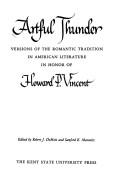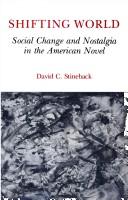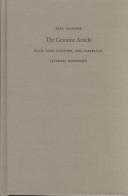| Listing 1 - 7 of 7 |
Sort by
|
Book
ISBN: 9780393924763 Year: 2006 Publisher: New York London : W. W. Norton,
Abstract | Keywords | Export | Availability | Bookmark
 Loading...
Loading...Choose an application
- Reference Manager
- EndNote
- RefWorks (Direct export to RefWorks)
This all-new edition of Hawthorne’s celebrated 1851 novel is based on The Ohio State University Press’s Centenary Edition of the Works of Nathaniel Hawthorne. It is accompanied by thorough explanatory annotations and an insightful introduction to the novel and antebellum culture by Robert S. Levine. "Contexts" brings together a generous selection of primary materials intended to provide readers with background on the novel’s central themes. Historical documents include accounts of Salem’s history by Thomas Maule, Robert Calef, Joseph B. Felt, and Charles W. Upham, which Hawthorne drew on for The House of the Seven Gables. The importance of the house in antebellum America—as a manifestation of the body, a site of genealogical history, and a symbol of the republic’s middle class—is explored through the diverse writings of William Andrus Alcott, Edgar Allan Poe, and J. H. Agnew, among others. The impact of technological developments on the novel, especially of daguerreotypy, is considered through the writings of Ralph Waldo Emerson, Gustave de Beaumont, and Alexis de Tocqueville, among others. Also included are two of Hawthorne’s literary sketches—"Alice Doane’s Appeal" and "The Old Apple Dealer"—that demonstrate the continuity of Hawthorne’s style, from his earlier periodical writing to his later career as a novelist. "Criticism" provides a comprehensive overview of the critical commentary on the novel from its publication to the present. Among the twenty-seven critics represented are Herman Melville, Harriet Beecher Stowe, Henry James, Nina Baym, Eric Sundquist, Richard H. Millington, Alan Trachtenberg, Amy Schrager Lang, and Christopher Castiglia. A Chronology and Selected Bibliography are also included.
Book
ISBN: 0820309923 Year: 1988 Publisher: Athens London University of Georgia Press
Abstract | Keywords | Export | Availability | Bookmark
 Loading...
Loading...Choose an application
- Reference Manager
- EndNote
- RefWorks (Direct export to RefWorks)
Fiction --- American literature --- Hawthorne, Nathaniel --- Geheim in de literatuur --- Hawthorne, Nathaniel, 1804-1864. The House of the Seven Gables --- Secrecy in literature --- Secret dans la littérature --- Sympathie dans la littérature --- Sympathie in de literatuur --- Sympathy in literature --- Criticism and interpretation --- James, Henry
Book
ISBN: 0226075222 Year: 1976 Publisher: Chicago The University of Chicago Press
Abstract | Keywords | Export | Availability | Bookmark
 Loading...
Loading...Choose an application
- Reference Manager
- EndNote
- RefWorks (Direct export to RefWorks)
Hawthorne, Nathaniel, 1804-1864. The House of the Seven Gables --- Fiction --- History and criticism. --- Hawthorne, Nathaniel, --- Melville, Herman, --- Criticism and interpretation. --- Hawthorne, Nathaniel --- Criticism and interpretation --- Melville, Herman --- American fiction --- 19th century --- History and criticism --- HAWTHORNE (NATHANIEL), 1804-1864 --- MELVILLE (HERMAN), 1819-1891 --- ROMAN --- 19E SIECLE --- HISTOIRE ET CRITIQUE

ISBN: 0873381726 Year: 1975 Publisher: Kent Kent State University Press
Abstract | Keywords | Export | Availability | Bookmark
 Loading...
Loading...Choose an application
- Reference Manager
- EndNote
- RefWorks (Direct export to RefWorks)
Hawthorne, Nathaniel, 1804-1864. The House of the Seven Gables --- Poe, Edgar Allan, 1809-1849. The Narrative of Arthur Gordon Pym --- American literature --- Romanticism --- History and criticism --- Addresses, essays, lectures. --- Vincent, Howard Paton, 1904- - Bibliography. --- History and criticism. --- Vincent, Howard Paton, --- Bibliography. --- 20th century --- Thoreau, Henry David --- Melville, Herman --- Criticism and interpretation --- Dickinson, Emily Elizabeth --- Crane, Harold Hart --- Emerson, Ralph Waldo --- Stevens, Wallace --- Nemerov, Howard --- Duncan, Robert Edward --- Vincent, Howard P., 1904 --- Vincent, Howard P.

ISBN: 0838716865 Year: 1976 Publisher: Lewisburg London Bucknell University Press Associated University Presses
Abstract | Keywords | Export | Availability | Bookmark
 Loading...
Loading...Choose an application
- Reference Manager
- EndNote
- RefWorks (Direct export to RefWorks)
Cooper, James Fenimore, 1789-1851. The Pioneers --- Faulkner, William, 1897-1962. The Hamlet --- Glasgow, Ellen Anderson Gholson, 1873-1945. The Sheltered Life --- Guthrie, A.B., Jr., 1901 . These Thousand Hills --- Hawthorne, Nathaniel, 1804-1864. The House of the Seven Gables --- American fiction --- Social change in literature --- Roman américain --- Changement social dans la littérature --- History and criticism --- Histoire et critique --- -Social change in literature --- American literature --- Roman américain --- Changement social dans la littérature --- 19th century --- 20th century
Book
ISBN: 9780816690602 9780816690572 Year: 2014 Publisher: Minneapolis London University of Minnesota Press
Abstract | Keywords | Export | Availability | Bookmark
 Loading...
Loading...Choose an application
- Reference Manager
- EndNote
- RefWorks (Direct export to RefWorks)
" In Settler Common Sense, Mark Rifkin explores how canonical American writers take part in the legacy of displacing Native Americans. Although the books he focuses on are not about Indians, they serve as examples of what Rifkin calls "settler common sense," taking for granted the legal and political structure through which Native peoples continue to be dispossessed.In analyzing Nathaniel Hawthorne's House of the Seven Gables, Rifkin shows how the novel draws on Lockean theory in support of small-scale landholding and alternative practices of homemaking. The book invokes white settlers in southern Maine as the basis for its ethics of improvement, eliding the persistent presence of Wabanaki peoples in their homeland. Rifkin suggests that Henry David Thoreau's Walden critiques property ownership as a form of perpetual debt. Thoreau's vision of autoerotic withdrawal into the wilderness, though, depends on recasting spaces from which Native peoples have been dispossessed as places of non-Native regeneration. As against the turn to "nature," Herman Melville's Pierre presents the city as a perversely pleasurable place to escape from inequities of land ownership in the country. Rifkin demonstrates how this account of urban possibility overlooks the fact that the explosive growth of Manhattan in the nineteenth century was possible only because of the extensive and progressive displacement of Iroquois peoples upstate.Rifkin reveals how these texts' queer imaginings rely on treating settler notions of place and personhood as self-evident, erasing the advancing expropriation and occupation of Native lands. Further, he investigates the ways that contemporary queer ethics and politics take such ongoing colonial dynamics as an unexamined framework in developing ideas of freedom and justice. "--
Hawthorne, Nathaniel, 1804-1864. The House of the Seven Gables --- Homoseksualiteit in de literatuur --- Homosexuality in literature --- Homosexualité dans la littérature --- Indianen in de literatuur --- Indians in literature --- Indiens dans la litterature --- Queer theory --- Théorie queer --- Gender identity --- Indians of Central America in literature --- Indians of Mexico in literature --- Indians of North America in literature --- Indians of South America in literature --- Indians of the West Indies in literature --- American literature --- 19th century --- History and criticism --- Thoreau, Henry David

ISBN: 0822327546 0822327643 9786613061898 1283061899 0822380315 Year: 2001 Publisher: Durham, N.C. London Duke University Press
Abstract | Keywords | Export | Availability | Bookmark
 Loading...
Loading...Choose an application
- Reference Manager
- EndNote
- RefWorks (Direct export to RefWorks)
Examines the formation of white middle-class manhood in the U.S.
American literature --- Thematology --- anno 1800-1899 --- Conscience raciale dans la littérature --- Hawthorne, Nathaniel, 1804-1864. The House of the Seven Gables --- Hommes dans la littérature --- Mannelijkheid in de literatuur --- Mannen in de literatuur --- Masculinity in literature --- Masculinité dans la littérature --- Men in literature --- Race awareness in literature --- Race dans la littérature --- Race in literature --- Ras in de literatuur --- Rasbesef in de literatuur --- 19th century --- History and criticism --- Men --- United States --- History --- Popular culture --- Race awareness --- Masculinity --- Brown, William Wells --- Criticism and interpretation --- Thoreau, Henry David --- Tubbee, Okah --- Poe, Edgar Allan --- Minstrel shows --- Race awareness in literature. --- Masculinity in literature. --- Race in literature. --- Men in literature. --- Human males --- Human beings --- Males --- Effeminacy --- Masculinity (Psychology) --- Sex (Psychology) --- Masculinity (Psychology) in literature --- Awareness --- Ethnopsychology --- Ethnic attitudes --- English literature --- Agrarians (Group of writers) --- Male authors --- History and criticism. --- Intellectual life.
| Listing 1 - 7 of 7 |
Sort by
|

 Search
Search Feedback
Feedback About UniCat
About UniCat  Help
Help News
News